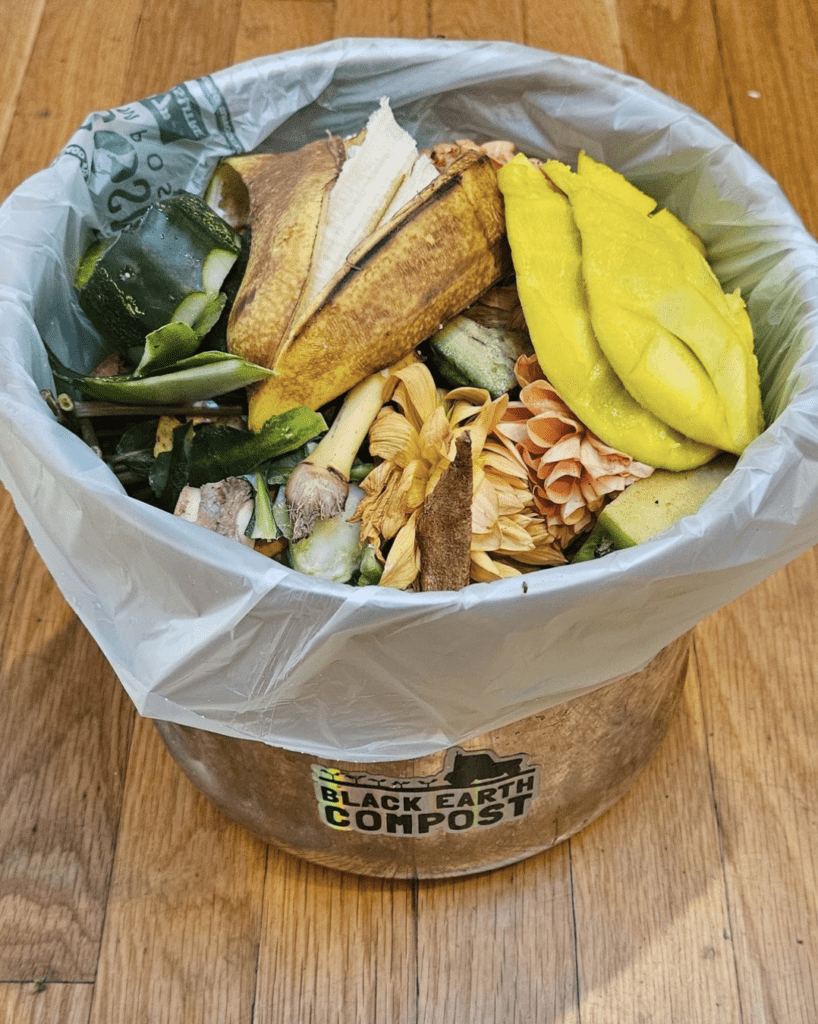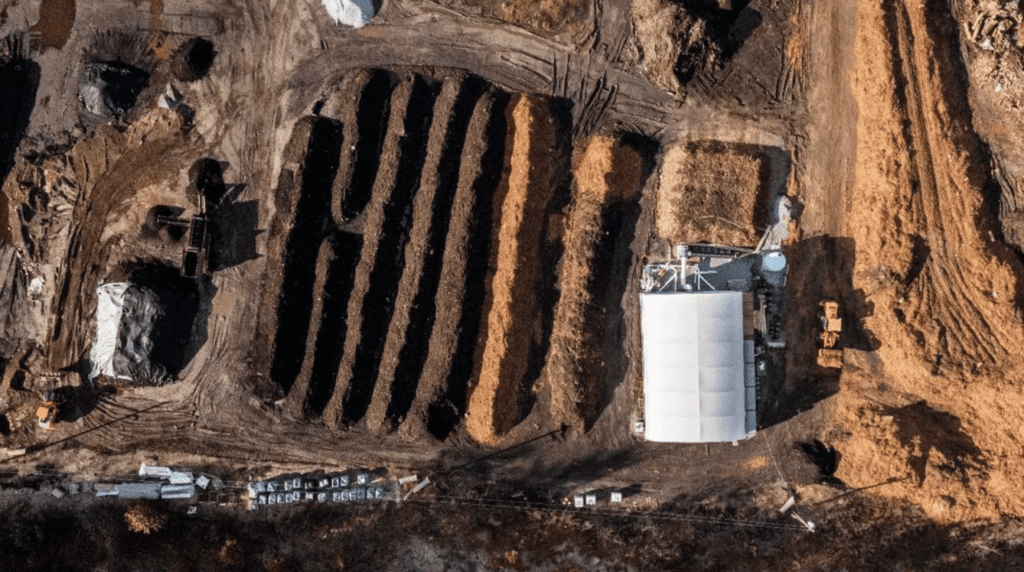Trash isn’t typically front-of-mind for most residents, except when it’s time to haul the bins to the street the night before pickup. But here’s the thing: Massachusetts’ own landfill capacity is dwindling, and waste is already being shipped as far away as Alabama.
As landfills close and space shrinks, the cost of municipal waste disposal is likely going to increase. Composting isn’t a magic fix, but it is a relatively easy way to significantly reduce trash. And, by separating out those food scraps, residents can help reduce greenhouse gas emissions and even return important nutrients to the soil.
Improving convenience to reduce trash (and costs)
Newton is already taking action. The city established a food waste drop site at the Resource Recovery Center in 2020, which was so well used the two 64-gallon bins required pickups twice a week. Newton recently added three more drop sites in different neighborhoods to improve convenience for residents who don’t subscribe to the pickup service.
Increasing availability of composting was a key recommendation in a 2021 report from the Newton Sustainable Materials Management Commission. “Removing organics from the trash stream would have the largest and most immediate impact on reducing trash,” according to the report. It makes sense: food waste accounts for 29.2% (38% for all organics) of residential trash at the Wheelabrator-Millbury combustion landfill, Newton’s contracted waste facility.
The same report notes the Millbury site contract expires in 2028.
“We assume but are not certain whether the Millbury WTE plant will operate beyond 2028,” the report states, “but Newton will almost certainly face significantly higher trash disposal costs in the next contract.”
Waneta Trabert, director of Newton’s Sustainable Materials Management Division, said Newton and Brookline have an open request for proposals (RFP) due April 23 which includes waste disposal services. Larger price increases are expected to occur every five years as new contracts take effect, she said.
According to the 2021 report, property taxes are paid into Newton’s general fund, which covers all waste management costs. Trabert said disposal costs are only 2.4% of the total budget, and that it’s “extremely unlikely that increases to costs for trash and recycling services would result in a tax increase.”

Why reducing the amount of trash sent to landfills is everyone’s problem
While trash is out-of-sight for most residents, it may soon not be so out-of-mind.
Published in June, the 2021 Solid Waste Data Update from the Massachusetts Department of Environmental Protection confirms that the state’s landfill capacity is shrinking. Here are some highlights:
- All five Massachusetts ash landfills are projected to close in the next nine years.
- Over a million tons of municipal solid waste were exported out of state in 2020 and 2021 (including over 23,000 tons to Alabama, 59,000 tons to Ohio, and 102,000 tons to South Carolina).
- Massachusetts’ five regular landfills will each meet current permitted capacity between 2024 and 2031 (and have lifetimes of between 2029 to 2040).
Trabert noted that Massachusetts exports 40% of its trash, leaving the state vulnerable to price increases and regulatory changes. She also pointed out the carbon footprint of transporting trash as far as Alabama is concerning.
“A slow-burning crisis is hard to quantify,” said the Newton. “Those of us in the waste industry see the writing on the wall – unless we collectively reduce our waste significantly, we will continue to increase exporting of trash for disposal.”
Alan Gordon, a board member of Green Newton, called out the negative impacts of the current waste management situation, and highlighted the anticipated cost increases of waste disposal.
“Landfills in MA are closing (both trash landfills and the ash landfills – the ‘ash’ is what is left over after incineration and is typically filled with toxic materials and requires special handling…),” he said. “It is expected that trash costs will go up considerably over the next few years as a result of the landfills closing. So it is in Newton’s interest to encourage residents to reduce the volume of trash in the blue (trash) bin.”

What composting can do for all of us
Given the complexities of recycling, composting food scraps is one of the biggest everyday shifts residents can make to reduce overall waste.
Newton contracts Black Earth Compost to manage pickup and disposal of food waste. Residents can subscribe for individual pickup, or bring their scraps to one of the four drop off sites around the city.
Partner Justin Sandler said Black Earth Compost serves more than 35,000 people in Massachusetts and Rhode Island, including 2,200 individual-pickup residents in Newton. They’re building a new regional composting facility in Manchester-by-the-Sea to meet current need and accommodate more.
“Everybody creates compostable material,” he said. “It doesn’t store well, so we don’t want it building up, and it’s useful. We can create a high-end soil amendment out of that.”
Sandler described it as a win on “10 levels.”
“It’s a win for waste reduction – less trash is better – it’s building our local soils,” he said. “We’ve been extracting nutrients out of our soil for so long.”
When compostable material sits in landfills it releases methane, Sandler explained, but Black Earth forces air into their piles to encourage breakdown, creating only a slight methane release. So, composting means a cleaner environment in more ways than one.
“We remove the leaves from our lawns…then we try to grow healthy plants and trees and we wonder why everything is getting sick,” he said. “This is a way of finally recharging the soil. The soil is a bank and we’ve been taking money out forever. …Our mission is to recycle nutrients.”
Sandler noted the Black Earth team has qualified the waste management situation in Massachusetts as a crisis as of five years ago.
“Trash management is foundational to society,” he said. “There’s grant money coming in to alleviate that…but people also have to follow through. A lot of old school towns are resistant to change, but times are changing.”

But what about recycling?
Trabert acknowledged that some have lost faith in the recycling system due to “sensationalized misinformation” by mainstream media.
“While it is true that recycling infrastructure could be improved, the recycling system as a whole and especially in the Northeast is working and 90% of the correct materials put into recycling bins are recycled into new materials,” she said. “Recycling accepted materials is far better than putting them into the trash.”
Trabert said the biggest factors causing so many recyclables in the disposal stream are 1. a lack of access, especially at large multifamily properties and businesses, and 2. a lack of participation, meaning residents or anyone generating recyclables not sorting them from the trash. She noted a lack of political will to enforce waste bans (like Newton’s plastic bag and polystyrene ban), but said it’s much less easily solved.
“By removing food waste, compostable paper, and recyclables from the trash we could reduce Newton’s trash by as much as 60%,” she said.
New habits will have an impact
Trabert said that while building these new habits can be challenging, she wants people to feel hopeful because they really can make a difference.
“I truly understand and appreciate that learning how to recycle right is hard and changing your habits in your kitchen to separate out food waste can be even harder,” she said. “There is a constant push-pull for many people trying to balance convenience with making the most sustainable purchasing decisions. And life for many people moves at such a fast pace that it’s challenging to use up a container of yogurt before it goes bad.”
Sandler encouraged people to try it out, because it’s less complicated than it seems.
“People overthink the complexity of it,” he said. “One of the main reasons people don’t sign up is because they think it’s going to be too complicated, but really you’ve got to try it first. It can help you be more cognizant of how much food you’re putting into your trash can. The ease of it comes from doing it, and if you’re not getting everything, you’re still getting some.”
Trabert encouraged folks who are already composting and recycling to spread the news.
“Folks who pay attention to stories about recycling and composting are very likely to be recycling right and composting already,” said a leader of Newton’s Sustainable Materials Management Division. “The best thing for these folks to do is to talk with their friends, family, and neighbors who may be less likely to pay attention to stories about recycling and composting to help them recycle better and start composting, as well.”
For residents who want to start building those new habits, Green Newton has some great tips and resources on how to reduce, reuse, and recycle, as well as compost, in day-to-day life.